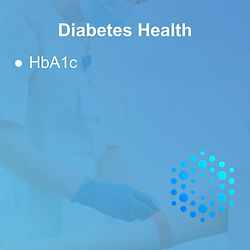Lipid Profile (Cholesterol) & HbA1c Test
Our Lipid Profile (Cholesterol) Blood Test with HbA1c and a Full Blood Count
Service Description
A Lipid Profile (Cholesterol Test) is a hugely important blood test used to monitor and screen for cardiovascular disease risk. The profile measures the amount of cholesterol and triglycerides in your blood along with HbA1c. This test also includes a Full Blood Count (FBC) looking at Red Blood Cells, White Blood Cells and Platelets. Our HbA1c blood test measures your average blood sugar levels over the past 2-3 months, providing essential insights into your long-term glucose control. This test is vital for diagnosing diabetes and prediabetes, monitoring diabetes management and assessing the effectiveness of treatments or lifestyle changes. Too much bad cholesterol and triglycerides can lead to deposits (plaques) in arteries. These can block and narrow blood vessels, potentially leading to heart attacks, strokes or clots. High cholesterol and triglyceride levels are a significant risk factor for cardiovascular disease, the leading cause of death globally. Our Lipid Profile (Cholesterol) & HbA1c Test tests for: - Total Cholesterol - LDL Cholesterol (the bad cholesterol) - HDL Cholesterol (the good cholesterol) - A Total Cholesterol to LDL Cholesterol Ratio - Triglycerides - HbA1c It is impossible to know your cholesterol levels and evaluate your true cardiovascular disease risk without a Cholesterol test. The added component of HbA1c will also give an indication of blood glucose control over the last 3 months, far superior to a glucose blood test. Regular cholesterol and HbA1c tests are recommended for those taking cholesterol medication, and those at a higher risk of cardiovascular disease: - a family history of high cholesterol or heart disease - overweight or obese - physically inactive - have diabetes or a family history - eat unhealthily - smoke cigarettes - are over 45 years old Don't delay in arranging your Lipid Profile (Cholesterol) & HbA1c Test. Book in Dublin or Kildare with us today. Most results within 24 - 48 hours. PLEASE NOTE: You are required to fast for at least 10 hours before your cholesterol test. You may still consume water. In fact, it's better for blood draws if you are well hydrated!






